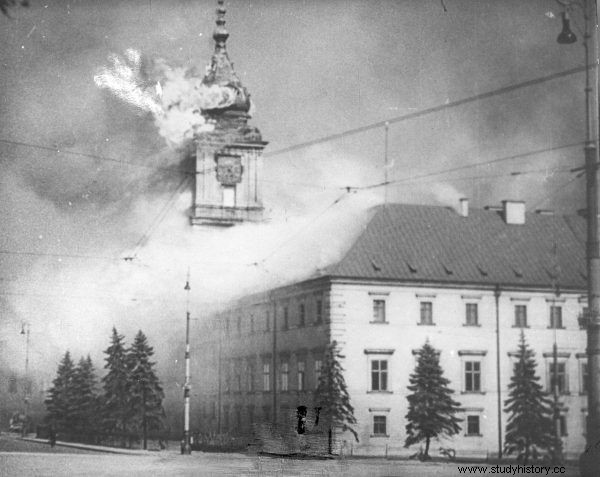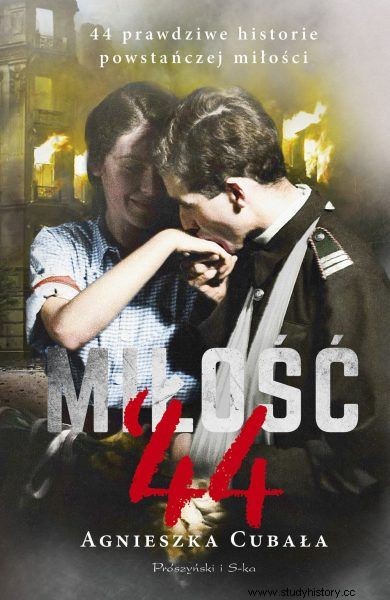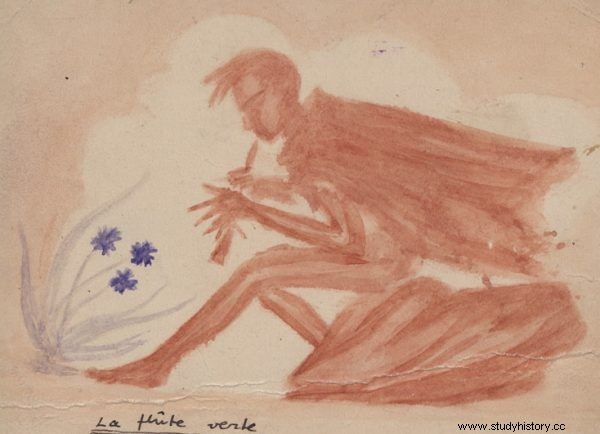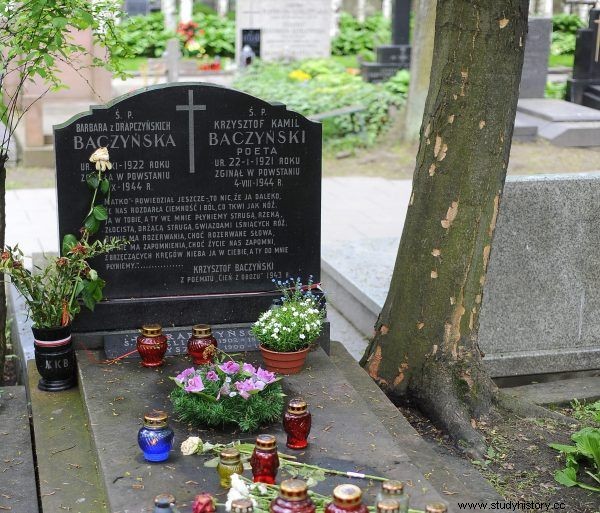Love at first sight, parents against the relationship, and war in the background - this story is reminiscent of "Romeo and Juliet". And, unfortunately, it ends in a tragic way, although the feelings that connected Krzysztof Kamil Baczyński and his wife Barbara Drapczyńska, she did not manage to overcome even death.
They appeared in a duet everywhere - where she was, he had to be. They did not see the world outside of themselves, but also (at least at first) were not particularly interested in the gray reality of war. The fruit of their love are some of the most beautiful erotica in the history of Polish poetry. Krzysztof Kamil Baczyński wrote them for his wife, unable to imagine life without her. Agnieszka Cubała in the book "Love '44" this is what characterizes their relationship:
Basia and Krzysztof provided proof that the theory about the two halves of an orange is true. They came into the world to meet . And when that happened, they lived only for themselves, in their own world, not paying much attention to what other people thought.
Meanwhile, the others were watching them carefully - there was something to look at.
Ordinary him, regular her…
It was obvious at first glance that they were a good pair. He - short (he was one hundred and sixty-five centimeters tall), according to many women "shapely, shapely, sensitive and extremely serious", and for some even "homely". She - slim, petite, with slightly slanted eyes, upturned nose and brown hair, a modest "gray mouse".
As he emphasizes in the book "Love '44" Agnieszka Cubała:“Krzysztof was fascinated primarily by her intelligence and lively temper. And the fact that she was able to keep pace with his discussions, especially about poetry and literature ". Meanwhile, Barbara, blindly blinded to the poet, was the most faithful fan of his work.

Krzysztof and Barbara met during the war, in German-occupied Warsaw.
They actually met by accident, on December 1, 1941, during secret matchups. He was 20, she turned 19. Two weeks earlier, while there was a heated debate about literature (or maybe logic), they developed a feeling that was to be stronger than war and death. It was love at first sight.
On the fourth day of their acquaintance, Krzysztof proposed to his chosen one - and Basia agreed immediately. And although an outside observer might consider their conversation a joke, soon the fiancées informed their parents about their plans. These - as you can guess - were not thrilled. Especially the poet's mother, who looked wryly at the "printer woman" (as she contemptuously called Barbara). However, the young got their way. They even forced the date of the ceremony to be postponed from September to June 1942. Why such a rush? A possible explanation is presented by Agnieszka Cubała in the book "Love '44" :
Krzyś made the decision to get married so quickly for two reasons. The first was love, the second was the feeling of death that he carried within him constantly. "Mom, I have to live my life very quickly," he said one day .
And that I won't leave you
After only six months of acquaintance, Barbara Drapczyńska and Krzysztof Kamil Baczyński stood on the wedding carpet. Under the conditions of Nazi occupation, the bride and groom could not even dream of a lavish ceremony and a grand wedding . But they didn't need that either. Wiesław Budzyński reports:
The wedding took place on Wednesday before Corpus Christi, June 3, 1942 at ten o'clock, in the church in Solec ... It was a beautiful day. Basia was dressed in a cream costume, she was holding a bouquet of lilies of the valley in her hand, and Krzyś was in a dark suit.

According to eyewitnesses, the bride and groom looked almost childish. As recalled by Jarosław Iwaszkiewicz, who came to the ceremony with a huge bouquet of lilacs:
After I got married, I said to someone:it didn't look like a wedding actually, but first communion. Both Baczyński's, very young, looked even younger, and since they were both small, it actually seemed that the two children were kneeling in front of the altar .
After the mass, the guests had fun at the Drapczyński house. In order to pay for the party, Basia's dad reportedly even sold a watch! Among the wedding guests, however, the groom's mother was missing:Stefania Baczyńska, after the lovers said the sacramental "yes" to each other, fainted. For the following days she did not want to see anyone because she was unable to accept the choice of her son.
Stefania's dislike for her daughter-in-law soon turned into true hatred. Worse, the two women had to live together in a one-room apartment. Apparently, they even tried to separate the common space with the use of sheets hanging around the room to ensure a minimum of intimacy; it is possible that they just couldn't look at each other . But that didn't prevent tensions, which eventually turned into brawls.

Baczyński, a talented poet and illustrator, was advised not to take part in fights and conspiracies.
It happened that Basia ran away from her mother-in-law to visit her parents. She also complained to her friends about how difficult her situation was. It must have been really uninteresting, since Stefania, as Baczyński's friend Jerzy Andrzejewski stated:" she considered her son's marriage to be an act of God and a great misalliance ". In the end, however, she decided to withdraw and - perhaps under the influence of Krzysztof's intervention - she left the apartment. The biographer of the poet, Zbigniew Wasilewski, describes:
After previous sharp conflicts between Stefania and Barbara Baczyńska, Krzysztof's mother left the apartment together and moved to Anin, where she started teaching in secret sets (...).
Since this event, which brought the desired peace to the home of the young couple, Krzysztof's constant task was to ease his mother's sense of loneliness and harm, and to give her special proofs of love and devotion.
Condemned to death
The young could finally start living their own way. However, they did not enjoy marital happiness for long. Soon the poet's restless spirit made itself felt, who, like so many others of his generation, dreamed of exchanging a pen for a rifle . No arguments against it appealed to him. Years later Jerzy Zagórski recalled:
We were so many mature people. We were not able to attack him with numerical superiority and authority alone, force him and explain that there is nothing to look for in these underground military exercises, "maneuvers" of the Home Army, which this slim twenty-year-old boy, always threatened with tuberculosis, suffering from asthma, with a halo of talent over the forehead.

Why we couldn't do it, even though we knew then there was some flaw in the strategy that sent this young man fording across rivers in the spring, camping, breaking out of ambushes. We talked about it among ourselves, we couldn't tell him strongly enough.
Krzysztof was probably the only one who supported Krzysztof in the decision to join the underground. To those who spoke their doubts aloud, she explained:" Read his poems carefully and you will see that he had no choice ". Her husband started his opposition activities in the famous "Zośka" battalion, later he joined "Parasol".
He turned out to be a much better poet than a soldier. His commander in the 2nd company of the "Zośka" battalion, Officer Cadet Andrzej Romocki, stated directly that Krzysztof was of little use in the field. Apparently, he shot poorly, and due to his poor health, he often lacked strength. A colleague from the ward, Stanisław Sieradzki, said:"He was so weak that I helped him carry a rifle." Nevertheless, in the "W" hour, he unhesitatingly set off to fight for the liberation of the capital from the hands of the Nazis. He died on the fourth day of the Warsaw Uprising by the bullet of a German sniper. Colleagues hurriedly buried him in the back of Blanka's palace - where he died.
Love conquered death
At that time, Basia was working as a volunteer in the hospital on Mariańska Street. Agnieszka Cubała in the book "Love '44" she reports:“She went around the houses collecting food and cigarettes for the injured. However, she had no news from Krzys, which worried her a lot. ”
She probably sensed the worst, but did not give up hope. She couldn't afford it because - as her mother later claimed - she was pregnant. She was looking for a husband to share the good news with and see that he was safe. She never found out for sure that her search was pointless . No one dared deliver her tragic news.

Krzysztof and Basia were buried in a common grave at the Powązki Cemetery.
During one of her "raids" in late August, she was injured in the head with a glass shard that was thrown into the air during the bombing. She was only a few steps away from the tenement house where her parents lived. A few days later, on September 1, 1944, she died. Apparently, in the last moments she was clutching her husband's book of poetry and repeating in a tumult:"I'm going to you, I'm going."
According to Feliksa Drapczyńska, the beloved accompanied Barbara on this last journey. Agnieszka Cubała describes:“The night before her daughter's death, her mother had a dream. Krzysztof came to Basia in it. He covered her with his entire coat and then took her with him ". How much is the truth and how much of the wishful thinking of a woman who has lost her daughter and (probably) a grandson? It's hard to say.
However, Death was unable to separate this extraordinary pair. Krzysztof Kamil Baczyński's body was exhumed in January 1947. In the end, the tragically deceased poet rested next to his wife and unborn child in a common grave at the Powązki Military Cemetery.
Check where to buy "Love '44. 44 true stories of insurgent love ”:
